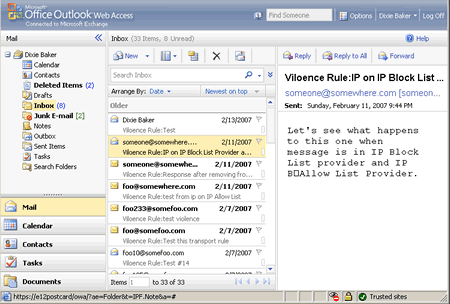For the record, I have no inclination of what or how useful Google's Chrome OS will be. News that a preview will be released next week has me excited though. This excitement is not driven by my urge to use it - hardly! A power user such as myself enjoys the complication of a sophisticated OS - Mac OS X and Windows 7 are 'fun' for me in levels that the average person would consider to be 'rocket science' (laughable really, considering the morons I've seen in IT, but I digress...), but did the average user ever ask for that kind of complexity?
Chetan Venkatesh, a wise man and CEO and founder of
Atlantis Computing, told me that he believed that Microsoft was in trouble in the consumer arena. Apple would take the high end and Google would take everything else. Let's break it down: What do users want from a computer? Web browsing, e-mail, media playback, some applications for their finances... hey, aren't all these things handled by the web browser?
Even iTunes shows signs of going the way of browser. Chrome is a solid browser and shows so much promise; to build an OS around appears to be logical.
I think I speak for the consumer when I say I just want to hit the power button and get to my (browser-fied) applications; that's it! I don't want to wait 10 minutes to logon to the computer, wait for the completely obtrusive virus scan to complete, double-check to make sure my WiFi is really connected (not partially - I know this improved somewhat over the crap-tastic WiFi support XP SP2 introduced), etc. How many prompts/how many obstacles/how much do I have to wait and suffer through just to get on Facebook?
Forget consumers, people just want their applications - that's it! Do I need or even remotely desire all the kludge that Windows 7/Vista/XP throws in our faces just to do basic tasks? And then I think of all the times where I ask users, "Did you make sure Windows updates are running, are you sure your virus definitions are up to date, when is the last time you defragged, etc." This is insane, particularly when you consider there are many users that still are unsure when to right-click a fucking mouse. OVER 20 YEARS AND PEOPLE STILL DON'T KNOW HOW TO USE A FUCKING MOUSE.
I don't think I can stress that last point enough. I know some would read this and think, "Well duh, they're just old people, they can't even find the power button." But wait, isn't that a problem in the design of most computers? So why limit the needlessly complicated use to the software. Yes, we have a MAJOR problem with hardware design as well. Let's take computers out of the equation for a minute. How many stupid buttons on your TV remote controllers (yes, plural on purpose) for one TV do you have that you will NEVER use. I'm looking at the three remote controllers it takes to just watch TV in my living room and I have counted over 70 buttons so far. 70 FUCKING BUTTONS. FUCK YOU SONY, OPTIMUM CABLEVISION, MICROSOFT ... Seriously, you clearly don't give a fuck about how I am going to actually use your products so I feel confident in giving you the one finger solute so hard your momma feels it.
This is why Apple will continue to gain market share. 5 years ago, that was not an assured statement to declare, but today an obvious one. Being unsure though did not preclude me from saying that 5 years ago. Design is all about how a product functions. Apple designs the best personal computers, period.
This is not to say that Apple will ever have the plurality of computers out there; hardly. Yes, one does pay a premium for an Apple product and that will always turn most buyers off. The fact of the matter is, Mac OS X is a very simplistic and unified (hardware and software) experience that is unmatched by even the most expensive PC. If I give someone a Mac I will likely only hear from them for a week or two with basic questions and then after that rarely. On the other hand, if I give someone a PC, oh boy... It's going to be constant with malware and viruses, printers not printing, BSoD's, etc. Yeah, that's what I want to do, spend 4 hours at a clip that I can never get back or charge enough for. Over the life of the PC countless hours of my life that are gone forever because Microsoft made the PC, "Eh, good enough". Apple's not perfect and Snow Leopard is the buggiest release yet, but at least it's manageable!

